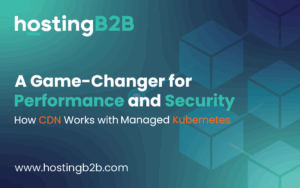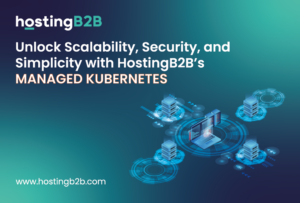
HostingB2B » Managed Kubernetes
Scalable Managed Kubernetes with Automatic Node Pool Scaling
Effortlessly deploy, manage, and scale Kubernetes clusters.

Kubernetes Plans
Managed Kubernetes
Flexible Pricing for Seamless Container Orchestration
Managed Kubernetes
Flexible Pricing for Seamless Container Orchestration
Managed Kubernetes
Flexible Pricing for Seamless Container Orchestration
Top-Tier Bare-Metal Performance and Management
Bare-Metal Support
Utilize Bare-Metal support for worker nodes to enhance latency and performance.
Free Cluster Management
Benefit from free, production-grade cluster management with a 99.9% SLA.
Great Value
Enjoy competitive pricing for worker nodes, on par with our VMs and Bare Metal servers.
Advantages of HostingB2B Managed Kubernetes
One-Click Provisioning
Provision your worker nodes with a single command in the HostingB2B self-service portal, API, or via Terraform.
GPU Worker Nodes Support
Our Managed Kubernetes clusters support GPU worker nodes for GPU-intensive tasks such as machine learning, video processing, and gaming.
Latest Versions
Support for Kubernetes versions 1.25, 1.26, 1.27, and 1.28.
Automated Control
The service continually monitors node health, automatically updating and restarting nodes as needed.
Automated Scaling
Node pools within your cluster can dynamically scale up or down automatically.
High Availability
Each cluster dashboard is duplicated to ensure constant availability.
Secure Connections
All connections between the master node and nodes within the cluster are automatically encrypted.
DDoS Protection
Your projects are shielded from DDoS attacks at the network and transport layers by default.
24/7 Technical Support
Receive prompt real-time assistance and high-quality technical service around the clock.
Get Performance Tailored to Your Needs


Virtual Machines as Worker Nodes
Deploying a Kubernetes cluster on Virtual Machines (VMs) involves an additional infrastructure layer—a hypervisor, which manages VMs. This hypervisor utilizes some of the physical server’s resources, such as CPU and RAM, which affects overall compute capacity.
VMs are ideal for most web applications that don’t require extreme performance levels or are not highly sensitive to latency. They offer a good balance of scalability, performance, security, and cost.
Benefits of Running a Kubernetes Cluster on VMs:
Faster node provisioning
Accelerated cluster scalability
Simplified OS updates and backups
SUPPORT & GUIDANCE
24/7/365 Free Premium Managed Kubernetes Support
Most importantly, our round the clock Support is available for you via Live Chat, Ticket System (Email) and MS Teams.

Bare Metal Servers as Worker Nodes
Deploying a Kubernetes cluster on Bare Metal means you bypass the hypervisor and guest operating system, allowing containerized applications to use physical server resources directly and fully.
Bare Metal is the optimal choice for compute-intensive web applications needing high performance and low latency, though it may not offer the fastest provisioning for new worker nodes.


Benefits of Running a Kubernetes Cluster on Bare Metal:
Superior compute performance
Reduced network latency
No issues with noisy neighbors
FAQ
Find answers to some frequently asked questions about Managed Kubernetes:
A managed Kubernetes service is a cloud solution in which the Kubernetes control plane provisioning, operation, maintenance, and scaling are handled by a third-party provider, such as HostingB2B. This implies that the provider abstracts away the operational overhead from the user by managing the intricate underlying infrastructure, which includes schedulers, controllers, API servers, etcd, and master nodes.
Clients don’t have to worry about the hassles of configuring and maintaining the Kubernetes infrastructure itself; they can concentrate on deploying and managing their apps (pods and containers) within the cluster. As a result, development teams can concentrate on coding and creativity while the management load is greatly lessened.
Yes, given the difficulty of self-managing a Kubernetes cluster, managed Kubernetes is well worth the investment for the majority of enterprises implementing containerized apps. Managed Kubernetes’s value proposition is found in:
- Decreased Operational Burden: Your team’s time is freed up as the provider takes care of the control plane’s setup, upkeep, upgrades, patching, and scaling.
- Excellent Availability and Dependability: Better uptime is ensured by managed services, which frequently come with expert monitoring and built-in redundancies.
- Cost-effectiveness: Although there is a service charge, it frequently surpasses the price of employing specialized DevOps engineers or the possible downtime caused by mistakes in self-management.
- Faster Time-to-Market: Put more effort into developing applications than maintaining infrastructure.
- Scalability: Easily expand your clusters to accommodate growing demand.
Managed Kubernetes enables companies of all sizes to take advantage of container orchestration’s power without having to deal with the high learning curve and overhead.
The allocation of accountability for the cluster’s operation is the primary distinction between self-managed and managed Kubernetes:
Self-Controlled Kubernetes: Every component of the Kubernetes cluster is your responsibility as the user, including provisioning and maintaining the worker nodes as well as the control plane (master nodes, etcd, etc.), managing security patches, upgrades, networking, storage, and troubleshooting. This calls for extensive operational work and in-depth knowledge.
Managed Kubernetes: The Kubernetes control plane is entirely under the control of the cloud provider (such as HostingB2B). They oversee its upgrades, patching, scaling, and uptime. Usually, your only responsibilities are to manage the apps (pods) that are installed on your worker nodes (though some services also handle these). Your team can concentrate on development as a result of the substantial reduction in operational complexity.
Indeed, Kubernetes is not only still relevant in 2025 and beyond, but it is also a fundamental component of contemporary IT infrastructure. Its significance is increasing due to a number of factors:
- Dominance of Containerization: Kubernetes continues to be the top orchestration platform for handling containers at scale, and containers have completely changed the way applications are deployed.
- Cloud-Native Future: The foundation of the cloud-native ecosystem, Kubernetes makes it possible for applications to be scalable, robust, and effective. Managed Kubernetes services are deeply integrated with major cloud providers.
- Enterprise Adoption: It has evolved from a buzzword to a seasoned, production-grade platform that powers vital workloads in financial services, healthcare, big businesses, and other industries.
- Extension into AI/ML & Edge: Its function is growing in the implementation of ML pipelines, AI models, and edge/IoT computing.
With new features and integrations, Kubernetes is developing and establishing itself as a long-term strategic foundation for cloud-native systems.
The degree of operational accountability that a service provider assumes for a Kubernetes cluster is directly related to the terms “managed” and “unmanaged cluster.”
- Managed Cluster: In a managed Kubernetes cluster, the Kubernetes control plane’s upkeep, upgrades, and general health are handled by the service provider (such as HostingB2B). This comprises the controller manager, scheduler, API server, etcd data store, and master nodes. Instead of concentrating on the essential Kubernetes infrastructure, you concentrate on your applications.
- Unmanaged Cluster (Self-Managed): In an unmanaged cluster, you are in charge of overseeing and controlling every aspect of the Kubernetes cluster, including the worker nodes and control plane. Deep knowledge of Kubernetes operations, monitoring, scaling, and troubleshooting is necessary for this.
Your team’s experience, available resources, and preference for operational control over infrastructure management outsourcing will all play a role in your decision.
Rather than referring to various software versions, the term “types of Kubernetes” usually describes the deployment and management strategies of Kubernetes clusters. The primary “types” or deployment models consist of:
- Services for Managed Kubernetes (like HostingB2B’s Managed Kubernetes): provided by cloud service providers (like GKE, EKS, and AKS) that manage the control plane.
- Self-Controlled Kubernetes: On-premises or on bare metal/VMs in a data center, you set up and maintain Kubernetes on your own infrastructure.
- On-Premises Distributions: Customized Kubernetes distributions (like OpenShift and Rancher) made for private data centers.
- Edge Kubernetes: IoT environments and resource-constrained edge devices are best served by lightweight Kubernetes distributions (such as k3s and MicroK8s).
These differences draw attention to different operational models that are tailored to meet the needs of various organizations and technical capacities.
The term “managed vs. unmanaged type” describes the degree of accountability and operational control in relation to Kubernetes or other infrastructure services.
Managed Type: The operational responsibility for maintaining the core infrastructure is assumed by the service provider (for example, a cloud provider like HostingB2B for Managed Kubernetes). This implies that the control plane for Kubernetes is managed by the provider, who also ensures its security, upgrades, and uptime. The user concentrates on installing apps.
Unmanaged Type: All service components must be set up, configured, monitored, maintained, and upgraded by the user. This calls for a great deal of in-house knowledge to manage both the control plane and worker nodes for Kubernetes.
Because of this distinction, organizations can select a model that fits their budget, strategic focus, and internal IT resources.
Kubernetes is an orchestration system that controls both pods and nodes; it is neither a pod nor a node.
The physical or virtual worker machine that runs your apps in a Kubernetes cluster is called a node. It includes the components required to execute workloads, such as kubelet, kube-proxy, and a container runtime (such as containerd).
The smallest deployable unit in Kubernetes is called a pod. It is an abstraction that contains one or more containers, as well as network and storage resources that are shared and a set of instructions on how to use them. Pods are planned to operate on nodes.
To guarantee that apps operate effectively and dependably, Kubernetes serves as the “brain” that plans and oversees these pods across a cluster of nodes.
Because Kubernetes is a numeronym—a word that substitutes numbers for letters—it is frequently shortened to K8s (pronounced “kates”). The “8” in this instance stands for the eight letters that separate the first “K” from the last “s” in “Kubernetes.”
For lengthy or commonly used terms, this kind of abbreviation is common in the tech sector (for instance, “i18n” for “internationalization,” where “18” represents the 18 letters that separate “i” and “n”). Its function in steering containerized applications is reflected in the name “Kubernetes,” which comes from Greek and means “helmsman” or “pilot.”
“Different kinds of Kubernetes” typically refers to different Kubernetes deployment models or distributions rather than core architectural differences. The main types consist of:
- Google Kubernetes Engine (GKE), Amazon Elastic Kubernetes Service (EKS), Azure Kubernetes Service (AKS), and HostingB2B’s Managed Kubernetes are examples of managed cloud Kubernetes services. These are widely used to abstract control plane management.
- On-Premises/Self-Managed Kubernetes: Setups in which businesses run the entire cluster on their own hardware, occasionally with the aid of programs like Kubespray or Kubeadm.
- Enterprise Kubernetes Distributions: On top of open-source Kubernetes, commercial products such as Rancher or OpenShift (Red Hat) offer extra features, tooling, and support.
- Lightweight Kubernetes Distributions: Made for development environments or edge computing, like K3s or MicroK8s, and optimized for low resource usage.
Because of these variations, users can select a Kubernetes solution that best suits their management preferences, budget, and particular environment.
Powering the Web: Our Latest Articles
How To: Unlock the Power of Web Solutions

Configuring Load Balancers with Annotations in Kubernetes
- Stratigou Timagia Avenue 18, Omega Business Center 2nd Floor, 6047, Larnaca/Cyprus
- +357 24 205888
- admin[at]hostingb2b.com
- sales[at]hostingb2b.com
HOSTING
SOLUTIONS


Security
Application Hosting
Solutions as a Service
Networking
Datacenter & Network Information
Company Blog
Legal
Company Info
- About Us
- Certification & Awards
- Investor Relations
- Contact Us
Careers & Affiliates
Contact Info
- +357 24 205888
- +357 96 881688
- admin[at]hostingb2b.com
- sales[at]hostingb2b.com




"Their dedication to ensuring customer satisfaction is evident. Its comforting to know that there's an responsive support team available, for assistance. Without hesitation I highly recommend Hosting B2B Cyprus for their service well as the exceptional support offered by George Sarris. Thank you for making our hosting experience a positive one."
"I have used these chaps for about a year now, and their response times and knowledge of their services is really excellent. The most recent time I needed to contact them was around adding in a temporary server just for a few days - they were so helpful and quick to respond. Just what I wish so many other companies would do (take note, AWS!!!)"
"Great company! It was especially pleasant to work services sales, who made every effort to get everything we needed on time and get a positive result in the end. Not everything went smoothly at the beginning, but Marina S. did her best to solve the initial problems. After a few months, I can say that I'm definitely satisfied."